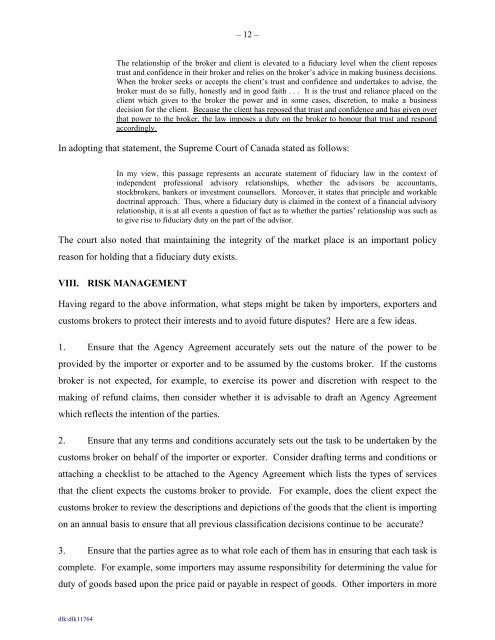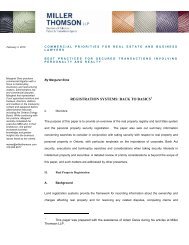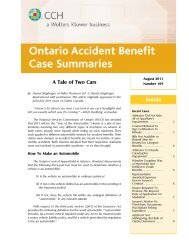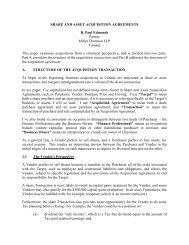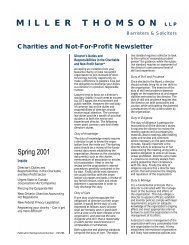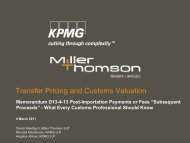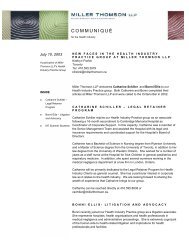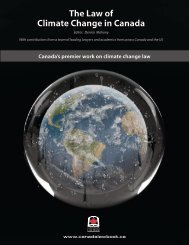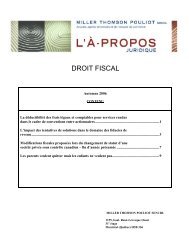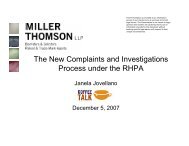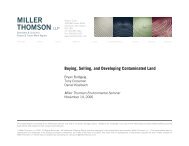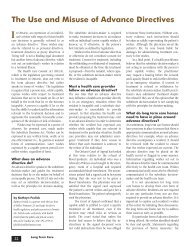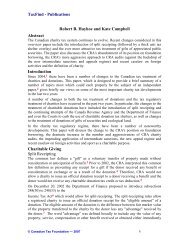importers & exporters and customs brokers - Miller Thomson
importers & exporters and customs brokers - Miller Thomson
importers & exporters and customs brokers - Miller Thomson
Create successful ePaper yourself
Turn your PDF publications into a flip-book with our unique Google optimized e-Paper software.
– 12 –The relationship of the broker <strong>and</strong> client is elevated to a fiduciary level when the client reposestrust <strong>and</strong> confidence in their broker <strong>and</strong> relies on the broker’s advice in making business decisions.When the broker seeks or accepts the client’s trust <strong>and</strong> confidence <strong>and</strong> undertakes to advise, thebroker must do so fully, honestly <strong>and</strong> in good faith . . . It is the trust <strong>and</strong> reliance placed on theclient which gives to the broker the power <strong>and</strong> in some cases, discretion, to make a businessdecision for the client. Because the client has reposed that trust <strong>and</strong> confidence <strong>and</strong> has given overthat power to the broker, the law imposes a duty on the broker to honour that trust <strong>and</strong> respondaccordingly.In adopting that statement, the Supreme Court of Canada stated as follows:In my view, this passage represents an accurate statement of fiduciary law in the context ofindependent professional advisory relationships, whether the advisors be accountants,stock<strong>brokers</strong>, bankers or investment counsellors. Moreover, it states that principle <strong>and</strong> workabledoctrinal approach. Thus, where a fiduciary duty is claimed in the context of a financial advisoryrelationship, it is at all events a question of fact as to whether the parties’ relationship was such asto give rise to fiduciary duty on the part of the advisor.The court also noted that maintaining the integrity of the market place is an important policyreason for holding that a fiduciary duty exists.VIII. RISK MANAGEMENTHaving regard to the above information, what steps might be taken by <strong>importers</strong>, <strong>exporters</strong> <strong>and</strong><strong>customs</strong> <strong>brokers</strong> to protect their interests <strong>and</strong> to avoid future disputes? Here are a few ideas.1. Ensure that the Agency Agreement accurately sets out the nature of the power to beprovided by the importer or exporter <strong>and</strong> to be assumed by the <strong>customs</strong> broker. If the <strong>customs</strong>broker is not expected, for example, to exercise its power <strong>and</strong> discretion with respect to themaking of refund claims, then consider whether it is advisable to draft an Agency Agreementwhich reflects the intention of the parties.2. Ensure that any terms <strong>and</strong> conditions accurately sets out the task to be undertaken by the<strong>customs</strong> broker on behalf of the importer or exporter. Consider drafting terms <strong>and</strong> conditions orattaching a checklist to be attached to the Agency Agreement which lists the types of servicesthat the client expects the <strong>customs</strong> broker to provide. For example, does the client expect the<strong>customs</strong> broker to review the descriptions <strong>and</strong> depictions of the goods that the client is importingon an annual basis to ensure that all previous classification decisions continue to be accurate?3. Ensure that the parties agree as to what role each of them has in ensuring that each task iscomplete. For example, some <strong>importers</strong> may assume responsibility for determining the value forduty of goods based upon the price paid or payable in respect of goods. Other <strong>importers</strong> in moredlk\dlk11764


